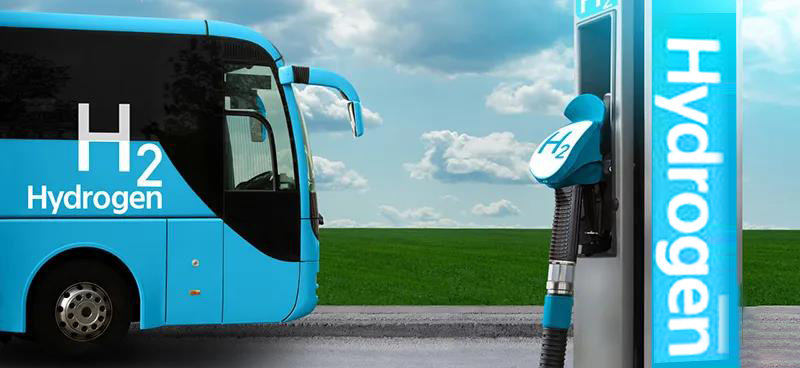
Recently, at the opening ceremony of the Winter Olympics, everyone must have been deeply impressed by the lighting of the torch. This advanced lighting is the ultimate romance of the Chinese people.
But you know what? It seems to be just a cluster of small torches, but in fact the “black technology” behind it hides a lot.
Unlike previous Olympic Games, which used a large amount of liquefied natural gas or propane gas as torch fuel, the torch of this Winter Olympics burns hydrogen energy, which achieves zero carbon emissions from the torch for the first time in the history of the Winter Olympics.
Whether it is the torch that lit the torch at the opening ceremony, or the more than 1,100 buses connected to the Olympic competition area, “hydrogen energy” has shown its talents.

What is hydrogen energy? Why use it in torches? Why can it also be used in cars? Let’s find out together today.
Why does the Winter Olympics torch use hydrogen energy?
Hydrogen energy, essentially an energy source, provides all kinds of energy for our life. From this point of view, the role of hydrogen energy is the same as that of traditional energy sources such as gasoline and natural gas. It is known as “green energy in the 21st century” because of its cleanness and high efficiency.
The three main characteristics of hydrogen energy are high energy density, wide sources and clean and low carbon.
Under the same ideal conditions, taking coal as an example, the energy released by 1kg of hydrogen energy is about 5 times that of 1kg of coal; at the same time, hydrogen energy has a wide range of sources, which can be reformed through coal, oil, natural gas and other fossil energy or industrial auxiliary Gas can also be produced directly through electrolysis of water; hydrogen energy is a clean and low-carbon energy source, and its final combustion product is water, which does not produce a large amount of pollutants and greenhouse gases like traditional energy sources.
Therefore, in addition to the continuous combustion of hydrogen fuel itself at low temperatures, the torch of the Beijing Winter Olympics has chosen hydrogen energy, which also utilizes the cleanness and zero emissions of hydrogen energy combustion.
In addition, regarding the color of the torch flame of the Winter Olympics, hydrogen gas burns in the air with a pale blue flame, which is almost invisible to the naked eye in the natural environment. To this end, researchers developed dozens of flame colors, and finally determined the yellowish color.
In addition to torches, hydrogen energy has also been widely used in Winter Olympics buses. One of the representatives of new energy vehicles, fuel cell vehicles, uses hydrogen energy as power.
What are the advantages of hydrogen energy vehicles compared to pure electric vehicles?
A hydrogen fuel cell vehicle is a vehicle powered by a hydrogen fuel cell. The chemical reaction between hydrogen and oxygen will generate a large amount of energy, thereby providing a steady stream of power for the vehicle.
Compared with traditional vehicles, hydrogen fuel cell vehicles have short refueling time, high energy density, and water emissions, which can truly achieve zero pollution and zero carbon emissions.
Hydrogen fuel cell vehicles refer to vehicles powered by hydrogen fuel cells, and pure electric vehicles refer to vehicles powered by lithium-ion batteries. The two have great differences in on-board battery, cost, and performance.
From the battery point of view, the hydrogen fuel cell is essentially a power generation device. Once the car is out of power, as long as the car is out of power, it can generate electricity and replenish energy to the car at any time. This is similar to adding gasoline to the car; while the lithium battery is an energy storage device. How much energy is in the pack directly determines how far the car can go. Once the battery pack runs out of power, it must take a while to re-store the power in the battery pack. Therefore, hydrogen fuel cell vehicles charge faster and run farther than pure electric vehicles.
From the perspective of vehicle cost, lithium batteries are relatively simple, the technology development is relatively mature, large-scale production has been achieved, and the cost is low; while fuel cell vehicles are technically difficult, key materials still rely on imports, and the cost of hydrogen refueling stations is much higher than Lithium battery charging station. Therefore, pure electric vehicles are more advantageous in terms of cost.

Crews are refueling the vehicle.
In terms of environmental protection, both hydrogen fuel cell vehicles and pure electric vehicles are environmentally friendly and low-carbon emissions. The discharge of hydrogen fuel cell vehicles is water. Compared with pure electric vehicles, improper treatment of battery electrolytes can easily cause environmental pollution. Hydrogen fuel cell vehicles are more green. Environmental friendly.
In other respects, hydrogen fuel cell vehicles need to carry high-pressure gas cylinders with the vehicle when driving, which is easy to cause hydrogen leakage during collision and hydrogen refueling, and the safety hazard is greater; at low temperatures, the performance of battery electrolytes in pure electric vehicles is reduced, and the battery The internal resistance increases, and hydrogen fuel cell vehicles perform better than pure electric vehicles at low temperatures.
On the whole, hydrogen fuel cell vehicles and pure electric vehicles have their own advantages and disadvantages, and the two basically show a trend of complementarity and common development.
What are the application areas of hydrogen energy?
Hydrogen energy, due to its own safety and the difficulty of storage and transportation, is not widely used in life.
In addition to the well-known hydrogen energy vehicles, hydrogen energy is mainly used in some small civil and commercial energy supply systems in daily life, such as small civil fuel cell power stations, small commercial fuel cell power stations, fuel cell drones, etc.
It is believed that with the continuous progress of science and technology, hydrogen energy technology will become more and more mature, bringing more and more cleaning assistance to our lives.
Comments